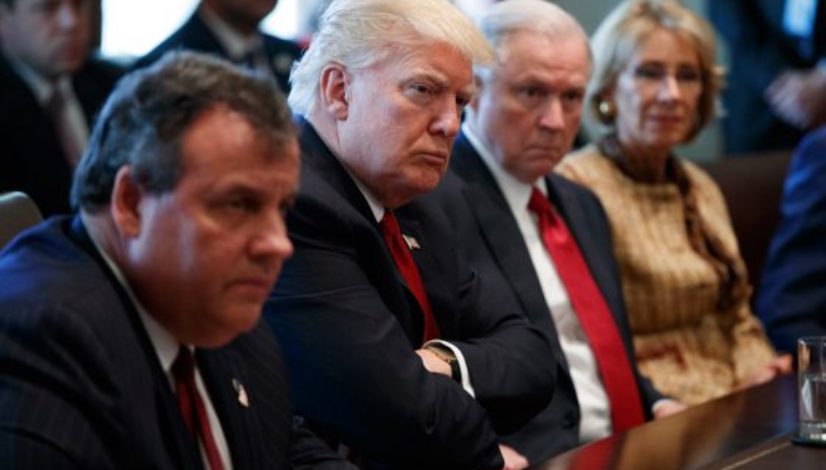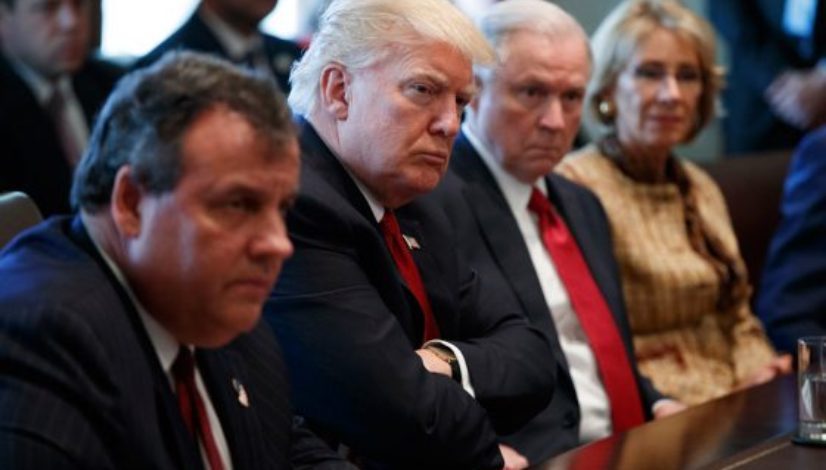Opioid commission members pessimistic that Trump, Congress will act

Published: Oct 23, 2017, 10:50 am • Updated: Oct 23, 2017, 10:50 am
By Greg Sargent, The Washington Post
As early as this week, President Donald Trump is set to declare the opioid crisis a “national emergency.” Trump telegraphed this when he recently told reporters that he would soon have a “major announcement” on the “massive opioid problem,” and people inside the White House are now leaking word that this announcement will herald an all-hands-on-deck push to combat the epidemic.
But members of Trump’s own handpicked commission to combat the epidemic aren’t nearly as confident, I’m told. They are increasingly worried that the Trump administration will not actually follow through with a robust response, even if he does go before the cameras and declare the crisis a national emergency, and they are increasingly annoyed by the efforts of people inside the administration who are resistant to such a response, one member of the commission says.
In a surprisingly blunt interview with me, Patrick Kennedy, the former congressman from Rhode Island who is a member of the President’s Commission on Combating Drug Addiction and the Opioid Crisis, candidly described the mood on the commission as one racked by pessimism about the president’s willingness and ability to follow through with a response that matches the scale of the human disaster that has unfolded.
The commission is set to release a final report of recommendations for combating the crisis on Nov. 1, and “the worry is that it won’t be adopted,” Kennedy tells me.
This apparently includes the head of Trump’s commission: New Jersey Gov. Chris Christie, R, whom Trump picked for the role. Kennedy told me that Christie has confided to him that he thinks failure on the opioid crisis could deal a debilitating blow to Trump’s presidency.
“Christie doesn’t mince words,” Kennedy said. “He said, ‘If he doesn’t recognize this as the issue of our time, his presidency is over.’ ” Kennedy added that Christie, an early supporter of the president, said he had conveyed a variety of this sentiment to Trump himself.
In August, the commission – which was created by Trump via executive order in March – released a preliminary report urging the president to declare the opioid crisis a “national emergency,” arguing that this would “empower your cabinet to take bold steps and would force Congress to focus on funding” a serious response to the epidemic. Such a declaration could also give the executive branch more flexibility to direct appropriated funds toward combating the crisis.
Related stories
- Can President Trump solve the opioid epidemic?
- “People die”: Former DEA division chief fought big pharma and lost
- Trump’s drug czar nominee withdraws after big pharma flap
- Colorado officials skeptical about new study’s finding that legal marijuana reduced opioid deaths
- Trump calls drug czar pick “a great guy” but he will “look into” connections to big pharma
Since then, it has been unclear whether Trump would actually go through with the declaration – that is, until last week, when he suddenly vowed that he would be doing just that. Politico reported that this blindsided members of the Trump administration, who are scrambling to figure out how a response commensurate with that declaration would be implemented. Politico also quoted unnamed officials saying that some in the administration, such as budget chief Mick Mulvaney, are wary that a declaration of national emergency could lock the administration into supporting overly large public expenditures to combat it.
Kennedy confirmed this to me on the record and went even further, claiming that these differences had resulted in tensions between Christie and administration officials such as Mulvaney. “The tension is between the Mulvaney crowd, who is ideological about the numbers, and the Christie crowd, whose fidelity is towards the reality of what’s most practical,” Kennedy said, adding that there are “internal arguments” underway that he defined this way: “Can we do this on the cheap, or are we going to be serious about saving lives?”
The key distinction to understand here is this: While it is certainly desirable for Trump to declare a national emergency, it is not clear how meaningful that will prove in substantive terms, even if he does it. Axios reports that the administration is preparing a massive “public relations” effort that will include unspecified requests for funds and a public role for Melania Trump.
But while such a general vow of seriousness will be welcome, what matters is the follow through. “Visiting rehab centers . . . been there, done that,” Kennedy said, by way of illustrating the difference between photo ops and an actual response.
This is where the recommendations of the president’s commission come in. Kennedy tells me that the commission members are converging on a fairly robust set of recommendations that include expanded health insurance coverage, training and deploying health-care workers to fill the requests of states for help, and additional subsidies to fund addiction treatment.
It will be on the administration to determine how to implement such a set of responses and what it might cost, but Kennedy says commission members worry that the administration will try to lowball that cost. “To implement the recommendations that we’ll offer, it will require hundreds of billions of dollars,” Kennedy says.
Vox recently published a good rundown on what experts think will be needed to combat the crisis. A combination of tactics is called for, including both prevention (such as strengthened federal oversight to reduce the amount of opioids flooding the market and prescriptions handed out to patients) and medicinal treatment for addiction (such as using methadone or naltrexone to blunt the craving for opioids).
The latest federal data show that more than 50,000 people died of drug overdoses in 2015 – 6 in 10 from opioids – and experts expect the 2016 numbers to be much worse, due to the worsening opioid crisis.
Trump’s declaration of an opioid emergency will collide with the GOP repeal drive
Another concern that commission members have is that even if Trump declares a national emergency on opioids, efforts to combat them will end up getting undermined by Trump/GOP health-care policies and priorities. Trump and Republicans have vowed to keep pushing for repeal of the Affordable Care Act, and any version of repeal would include enormous cuts to Medicaid, which commission members fear would set back efforts to combat the crisis, including deep in Trump country.
What’s more, Kennedy says that continued sabotage of the ACA by Trump could also undermine such efforts, since destabilizing the exchanges could leave lower-income people without coverage options in parts of the country hit hard by the opioid epidemic.
Kennedy tells me he has been pushing for the commission’s final report to include a firm declaration that further efforts to repeal or sabotage the ACA would run counter to the goal of treating opioids as a national emergency. He says other members of the commission who are Republican governors, including Christie and Charlie Baker of Massachusetts, agree with this. Another member, Gov. Roy Cooper of North Carolina, D, has voiced this sentiment publicly.
“The current efforts to repeal the ACA, as opposed to strengthening it, are irreconcilable with dealing with this crisis in the way that it needs to be dealt with,” Kennedy says, adding that there’s widespread agreement on the commission on this point.
This will set up a very bad political problem for Trump: His own declaration that opioids are a national emergency will – or should – dramatically undercut any further efforts to repeal or sabotage the health-care law, a goal Trump and Republicans can’t seem to wean themselves off of.
In the end, what will the commission members do if the administration falls short of the response they are advocating?
“Every single member of this commission has principled independence on this issue,” says Kennedy. “I believe they’ll distance themselves from the president if he doesn’t follow our recommendations.”
Sargent is a Washington Post columnist.
Topics: budget, chris christie, donald trump, health insurance, medicaid, opioid epidemic, Trump administration




